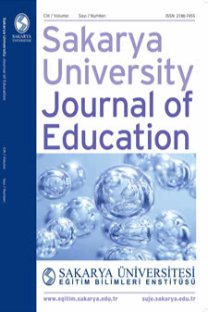Student Opinions on Task-Based Approach as Formative Evaluation versus Exam-Based Approach as Summative Evaluation in Education
task-based approach, exam-based approach, formative assessment, summative assessment ELT, education,
___
- Alderson, J. C. (2005). Diagnosing foreign language proficiency: The interface between learning and assessment. A&C Black.
- Alvarez, L., Ananda, S., Walqui, A., Sato, E., & Rabinowitz, S. (2014). Focusing formative assessment on the needs of English language learners. San Francisco, CA: WestEd.
- Antoniou, P., & James, M. (2014). Exploring formative assessment in primary school classrooms: Developing a framework of actions and strategies. Educational Assessment, Evaluation and Accountability, 26(2), 153-176.
- Baranovskaya, T., & Shaforostova, V. (2017). Assessment and Evaluation Techniques. Journal of Language and Education, 3(2), 30-38.
- Buren, A.V. (n.d.) Retrieved March 9, 2018 from http://thinkexist.com
- Cheng, L., Rogers, T., & Hu, H. (2004). ESL/EFL instructors’ classroom assessment practices: Purposes, methods, and procedures. Language Testing, 21(3), 360-389.
- Dixson, D. D., & Worrell, F. C. (2016). Formative and summative assessment in the classroom. Theory into practice, 55(2), 153-159.
- Garrison, C., & Ehringhaus, M. (2007). Formative and summative assessments in the classroom. Retrieved from: http://www.amle.org/Publications/WebExclusive/Assessment/tabid/1120/Default.aspx
- Good, E. (2017). Formative assessment. ABC of Learning and Teaching in Medicine, 59.
- Hadi, A. (2013). Perceptions of Task-Based Language Teaching: A Study of Iranian EFL Learners. English Language Teaching, 6(1), 103-111.
- Hismanoğlu, S. (2012). İngilizce öğretmeni adaylarının İngilizce öğretmeni yetiştirme programı ile ilgili görüşleri. Eğitim ve Öğretim Araştırmaları Dergisi, 1(2), 330-341.
- Jensen, J. L., McDaniel, M. A., Woodard, S. M., & Kummer, T. A. (2014). Teaching to the test… or testing to teach: Exams requiring higher order thinking skills encourage greater conceptual understanding. Educational Psychology Review, 26(2), 307-329.
- Ketabi, S., & Ketabi, S. (2014). Classroom and formative assessment in second/foreign language teaching and learning. Theory and Practice in Language Studies, 4(2), 435.
- Kılıçkaya, F. (2016). Washback effects of a high-stakes exam on lower secondary school English teachers’ practices in the classroom. Lublin Studies in Modern Languages and Literature, 40(1), 116.
- Lau, A. M. S. (2016). ‘Formative good, summative bad?’–A review of the dichotomy in assessment literature. Journal of Further and Higher Education, 40(4), 509-525.
- López-Pastor, V., & Sicilia-Camacho, A. (2017). Formative and shared assessment in higher education. Lessons learned and challenges for the future. Assessment & Evaluation in Higher Education, 42(1), 77-97.
- Lovett, M. C. (2013). Make exams worth more than the grade. Using reflection and metacognition to improve student learning: Across the disciplines, across the academy, 18-52.
- Mackatiani, C. I. (2017). Influence of Examinations Oriented Approaches on Quality Education in Primary Schools in Kenya. Journal of Education and Practice, 8(14), 51-58.
- McDowell, L. (1995). The impact of innovative assessment on student learning. Innovations in Education and Training International, 32(4), 302-313.
- Mohamadi, M., Alishahi, Z., & Soleimani, N. (2014). A study on test anxiety and its relationship to test score and self-actualization of academic EFL students in Iran. Procedia-Social and Behavioral Sciences, 98, 1156-1164.
- Prabu, P. S. (2015). A study on academic stress among higher secondary students. International Journal of Humanities and Social Science Invention, 4(10), 63-68.
- Rillero, P., & Padgett, H. (2012). Supporting Deep Conceptual Learning: Technology Can Help Educators Train Students' Focus Away from Rote Memorization toward Deep Conceptual Learning by Building on Prior Knowledge and Making Connections between Concepts. THE Journal (Technological Horizons In Education), 39(9), 37.
- Santamaría Lancho, M., Hernández, M., Sánchez-Elvira Paniagua, Á., Luzón Encabo, J. M., & de Jorge-Botana, G. (2018). Using Semantic Technologies for Formative Assessment and Scoring in Large Courses and MOOCs. Journal of Interactive Media in Education, 2018(1).
- Shi, H. (2017) Examining the Effectiveness of Formative Assessment in English Vocabulary Learning of Senior High School Students in China. Asian EFL Journal, 101, 61-82.
- Stake, P. (Scriven, 1991:169) “What is Formative Assessment?” Retrieved March 18, 2018 from: http://teachingthroughthearts.blogspot.com/2011/07/formative-assessment-when-cook-tastes.html
- Taras, M. (2005). Assessment–summative and formative–some theoretical reflections. British journal of educational studies, 53(4), 466-478.
- Taras, M. (2008). Summative and formative assessment: Perceptions and realities. Active learning in higher education, 9(2), 172-192.
- Teodorczuk, A., Fraser, J., & Rogers, G. D. (2018). Open book exams: A potential solution to the “full curriculum”?. Medical teacher, 40(5), 529-530.
- Uzun, L. (2012). What is your educational philosophy? Modern and postmodern approaches to foreign language education. Studies in Second Language Learning and Teaching, 2(3), 333-348.
- Uzun, L. (2014). Raising Awareness of Educational Philosophy: Learning and Education in Posthumanistic Philosophy. Journal of Theory and Practice in Education, 10(3), 613-626.
- Uzun, L. (2016). Evaluation of the latest English language teacher training programme in Turkey: Teacher trainees’ perspective. Cogent Education, 3(1), 1147115.
- Yavuz, A., & Zehir Topkaya, E. (2013). Teacher Educators' Evaluation of the English Language Teaching Program: A Turkish Case. Novitas-royal (research on youth and language), 7(1), 64-83.
- Yu, L., & Suen, H. K. (2005). Historical and contemporary exam-driven education fever in China. KEDI Journal of Educational Policy, 2(1).
- ISSN: 2146-7455
- Yayın Aralığı: 3
- Başlangıç: 2011
- Yayıncı: Sakarya Üniversitesi Eğitim Bilimleri Enstitüsü
Assessing the Psychosocial Classroom Environment of Teacher Training Classrooms
Onur İŞBULAN, Mübin KIYICI, Aydın KİPER, Ali KIRKSEKİZ, Selçuk Sırrı TERCAN
Yabancı Dil Olarak Türkçe Öğretiminde Kullanılan Bilişim Teknolojileri Üzerine Bir İnceleme
Ortaöğretim Biyoloji Ders Kitaplarında Değerlerin Analizi
Lise Öğrencilerinin Motivasyon Kaynakları ve Karar Verme Stratejileri
Meltem YALIN UÇAR, Nilgül Zuhal AKTAŞ
Eda GENÇ, Hacer ÇALIŞKAN, Doğan YÜKSEL
Ali KIRKSEKİZ, Onur İŞBULAN, Akiper@sakarya.edu.tr AKİPER@SAKARYA.EDU.TR, Selçuk TERCAN, Mübin KIYICI
